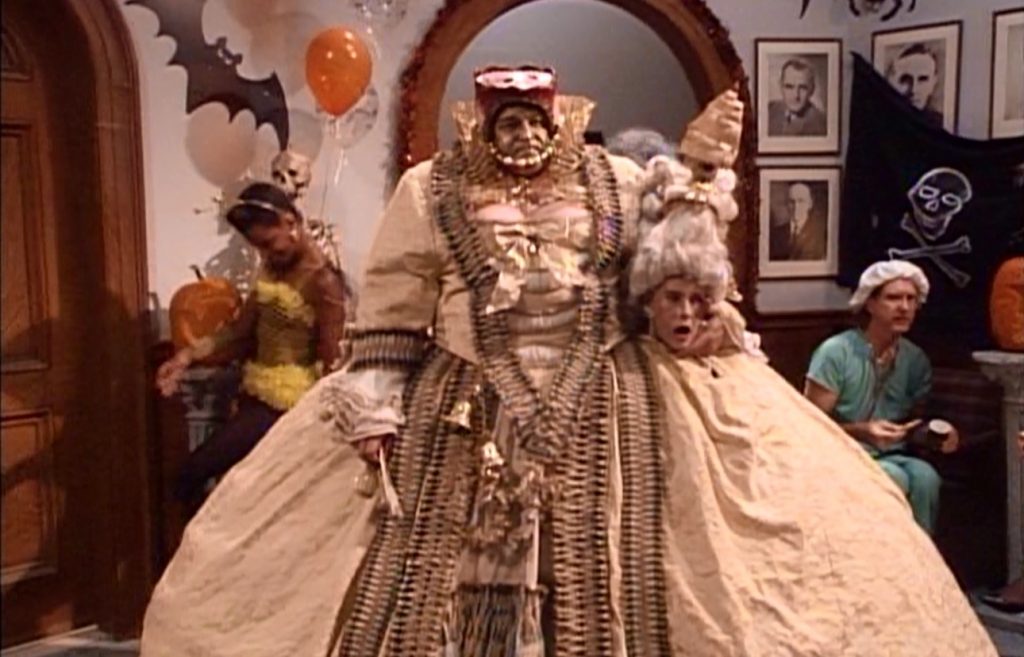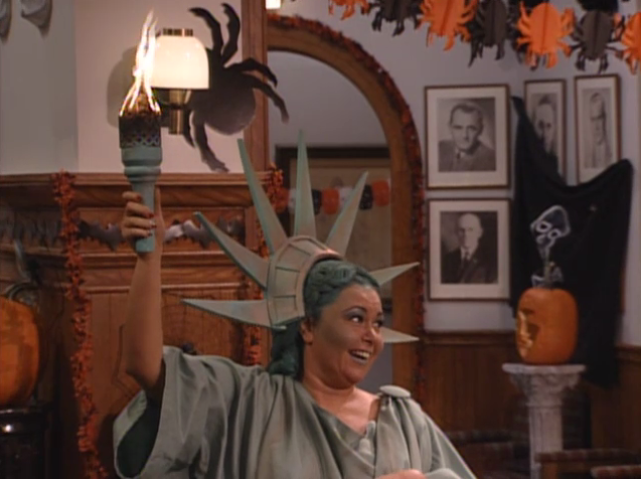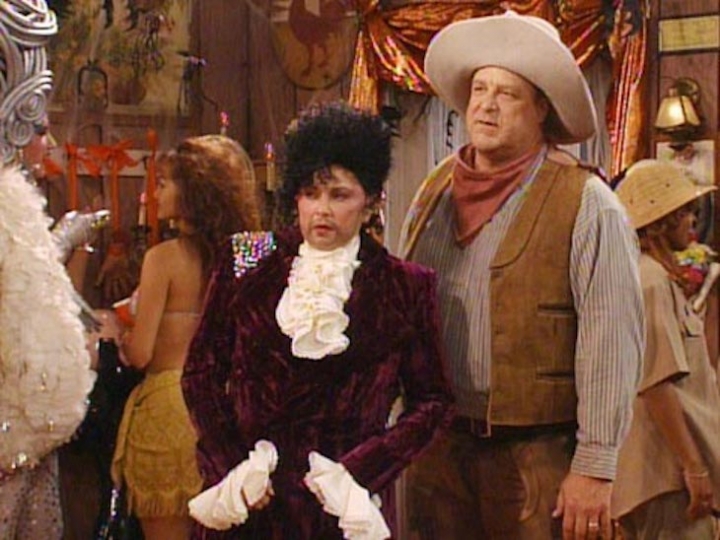Some families have Christmas, and others have Easter. Friends had Thanksgiving. But no TV family has ever done Halloween like the Conners. This week marks 30 years since the first Halloween episode of Roseanne aired back in 1989. And in the three decades since, nobody else has come close to touching the legacy of Halloween on Roseanne.
Other television series might have featured Halloween in the past, but Roseanne certainly invented the Halloween TV episode as we know it. In the 21st century, almost everyone has done Halloween—from Modern Family, to The Big Bang Theory, and even Desperate Housewives. But arguably none of that would have existed if it weren’t for the Conners’ elaborately planned spectacles at scaring each other on the spookiest day of the year. “For a while, they refused to let us have a Halloween episode, because they said the Bible Belt doesn't like Halloween, that they think it’s satanic, so they didn’t want it on ABC,” Roseanne Barr told Yahoo TV in 2014. “And we’re like, ‘Are you crazy? People trick-or-treat, you know. It’s a big holiday.’ They were very kind of fundamentalist about it, but you know, that was the first dragon we slayed on the Roseanne show.” And it certainly wouldn’t be the last. Barr also shared in the video commentary on the DVD release of the series’ Halloween episodes that the only reason she wanted to get into television was to break all the rules of television—and there’s no doubt she accomplished that and more, in the best and worst ways possible.

Roseanne’s first Halloween episode, “BOO!”, was the seventh episode of the series’ second season and first aired on October 31, 1989. It set the standard for a Halloween celebration like no other that would continue for every year the show was on the air. And while it might not have seemed unordinary for a family sitcom to celebrate Halloween, regardless of religious objections, Halloween on Roseanne became revolutionary because they did it like nobody else ever had—just like the rest of the show. The Conners were just like you, and not ashamed to show it. They were unabashedly unpolished. They were overweight junk food eaters. They belched and bellowed, and fought over the TV remote. They struggled to make ends meet and occasionally had their power shut off (John Goodman often joked that the Conners were poor because they spent all of their money on Halloween). Their kids fought with their parents, and vice versa. Nothing was ever solved into a happily ever after by the final commercial break—but there was always impeccable writing and Roseanne’s signature wit, brash sarcasm, and comedic timing to relieve the tension. It’s no surprise they brought all of that and more to their Halloween episodes, and in fact, it was on Halloween when Roseanne did what Roseanne did best: break the rules, and make us laugh about it.
Dan and Roseanne trying to outdo one another by scaring each other would become a staple of the Halloween episodes. John Pasquin, who directed every episode of Roseanne’s second season, remembered the couple’s “one-upsmanship” as his favorite part of the Halloween episodes, particularly from that first one from 1989. “This is the kind of thing that actually does go on in your household when you have a couple who is playful, just trying to get the better of your mate,” he said. “That was such a nice through-line, apart from all of the dressing up, and the makeup and the hair and all that stuff… a couple really just having fun and trumping each other.” In “BOO!”, Dan and Roseanne quip back and forth at who is “the master” at scaring the other. Although they both play a good game, it is Roseanne who emerges victorious—setting a precedent for every other aspect of the series—by faking a phone call with her mother in the episode’s final moments, saying they are coming to stay with them indefinitely. Dan’s immediate panic leads him to bow in gratitude at the prank. Roseanne, despite her faults, will always be the Master of Halloween.

Like any cultural text from decades ago, we might also argue some aspects of Roseanne’s Halloween celebrations have not, what we call, “aged well.” But on the other hand, considering the social context in which they originally aired—the American working-class in the Midwest, late eighties and the nineties—it was Roseanne’s daring social commentary that grew more ambitious as the show went on that propels the Halloween episodes to the forefront of why Roseanne, as a whole, was groundbreaking. A key example is “Trick or Treat,” the show’s second attempt at Halloween in its third season, that remains relevant in the social progression of American popular culture. The episode begins with Dan playing poker with his buddies at the Conners’ kitchen table, a common occurrence throughout the series. These poker games were often portrayals of stereotypical patriarch activity, the act of the male of the household “blowing off steam” or “doing a man thing.” In “Trick or Treat,” the less than classy Arnie (Tom Arnold) tells his friends a story about mail-order brides, and the rest of the men continue a conversation that can only be described, by our modern standards, as “locker room talk.” The talk grinds to a halt when Roseanne and Jackie enter the kitchen, with Dan redirecting the conversation into something about tools. But the icing on the cake comes a mere moments later, when DJ (Michael Fishman) enters the scene in his Halloween costume, as a witch with a broom. Roseanne and Jackie are enthusiastic, but Dan immediately sends him upstairs in a panic before his friends see him. “Two daughters aren’t enough for you?” he asks Roseanne. “Witches are girls.” Roseanne, as only she can, breaks the tension perfectly in the episode’s best line. “This is the nineties, Dan. Witches are women.” The women see no issue with DJ’s costume and when Roseanne questions Dan on why he had no issue with Darlene (Sara Gilbert) dressing up as a pirate three times, Dan dismisses that costume as “cute” and insists that if they let DJ go out as a witch, he will come home with a bloody nose. It’s such an impeccably perfect textbook example of toxic masculinity that the cultural criticism basically writes itself. “DJ, instead of a witch, you wanna dress up like Madonna?”
This was not the first time that toxic masculinity and heteronormative gender norms were explored on Roseanne, and it certainly wouldn’t be the last. After Dan convinces DJ to ditch his broom in an attempt to rebrand him as a warlock, he can’t shake a sense of guilt from preventing his son from being who he wanted to be. The episode didn’t solve Dan’s masculine panic, and no episode ever does, but this was 1990, and it did at least allow space for some understanding and forgiveness. Dan even pretends that Roseanne is his husband when, in a turn of events, Jackie and Roseanne end up stranded at the Lobo Lounge on Halloween and Roseanne takes her male lumberjack disguise a little too far. It makes me think of the time I dressed up as a witch with a broom as a child, fourteen years after this episode aired, as well as my own doubts and whether I should call myself a warlock instead. But my parents embraced my costume idea without hesitation, as they always did, and reminds me how far we have come with dismantling gender norms and heteronormativity—and how far we still have left to go.

It might not seem like much today, but Roseanne made social commentary regarding gender roles and toxic masculinity a mainstay in American primetime television, in an era before Ellen was cancelled or Will & Grace premiered. “Trick or Treat” wasn’t even the only Halloween episode to address such topics—“Skeleton in the Closet,” from the seventh season, not only continued to push boundaries but if anything showcased how far Roseanne had also progressed since season three (it also featured Roseanne Barr’s personal favorite costume, when she dressed up as Prince). That year’s Halloween celebration revolved around Leon (Martin Mull)—Roseanne’s former boss and later business partner, and an openly gay character—throwing a Halloween party at the Lunch Box, Roseanne and Jackie’s business in which he had bought a stake. It prompted most of the episode’s subtext to revolve around gay people in an attempt to provide a “they’re just like us” narrative, which ultimately doesn’t hold up against the multitude of homophobic jokes. Roseanne Barr originally added gay characters in the form of Leon and Nancy (Sandra Bernhard) to the series in an effort for representation, since she had gay siblings, but the plight for gays and lesbians to be seen on Roseanne was often lost in the context of the homophobia necessary for them to even be there in the first place. Nonetheless, they were there, and any publicity is in fact good publicity when it comes to sparking a conversation. In other words, Dan’s prank on Roseanne that year in which everyone leaves clues to convince Roseanne that Jackie’s husband Fred (Michael O’Keefe) might be gay might not still be funny in our modern context, and might not have “aged well.” But in 1994—when Ellen still wasn’t out yet and Will & Grace still didn’t exist—it was something. It was something that said gay people exist, even if Roseanne often made a joke out of them.
It would be difficult to even discuss the possibility that some of Roseanne’s Halloween episodes haven’t “aged well” when the current popular opinion suggests that Roseanne—the sitcom or the person—has certainly not aged well, either. I’m pretty sure merely the word Roseanne is still polarizing, given her current penchant for racism that lost her a lot of fans during the 2016 U.S. election as well as the highly successful revival of Roseanne, which aired for 9 episodes in 2018 before being unceremoniously cancelled after Barr made racist comments about Valerie Jarrett on Twitter. But it would be difficult to argue that Roseanne is only polarizing and one of the most hated people on the planet in the present, when back in the early nineties, she was also polarizing and one of the most hated people on the planet. Back then, she was overweight, rejected femininity, and said what she wanted. It worked in her favor when what she did and said pushed boundaries and allowed room for representation, but when she began turning her unruliness towards racism and bigotry, it was for many—at the very least—jarring and horrifying.

Perhaps the saving grace to ensuring Roseanne’s legacy, and especially that of its Halloween episodes, will be The Conners, the spin-off series that ABC rebranded the revival as after its cancellation (the series premiere effectively killed off Roseanne from an opioid overdose). The spin-off will take its second stab at Halloween this year, with an episode that sees Jackie (Laurie Metcalf) learning that a local Chinese restaurant is closing and seeing an opportunity to reopen the Lunch Box without her late sister. The Conners has already amused fans with a blast from the past earlier this season with a guest appearance by Meagan Fay, who played Roseanne’s neighbor Kathy during Roseanne’s fourth season—and who Dan and Roseanne play a particularly gruesome Halloween prank on in “Trick Me Up, Trick Me Down.” Last year, The Conners tried their hand at a Halloween episode that saw Darlene’s son Mark (Ames McNamara) grappling with a costume ban at his school, and the episode also introduced guest star Matthew Broderick as Jackie’s boyfriend Peter. It certainly wasn’t the same without Rosie, but the spin-off will have a second chance this week not only with Jackie’s blast from the past but also when DJ’s daughter Mary (Jayden Ray) gets upset when someone assumes she is adopted based on the color of her skin. The episode will air Tuesday, October 29 on ABC. The Conners might not have Roseanne’s loud-mouthed wit or sarcasm (or, as of late, her racism) to break tension anymore, but the spin-off is still making excellent use of the social commentary, pushing of boundaries, and evidently celebrations of Halloween that Roseanne pioneered 30 years ago.


No comments:
Post a Comment